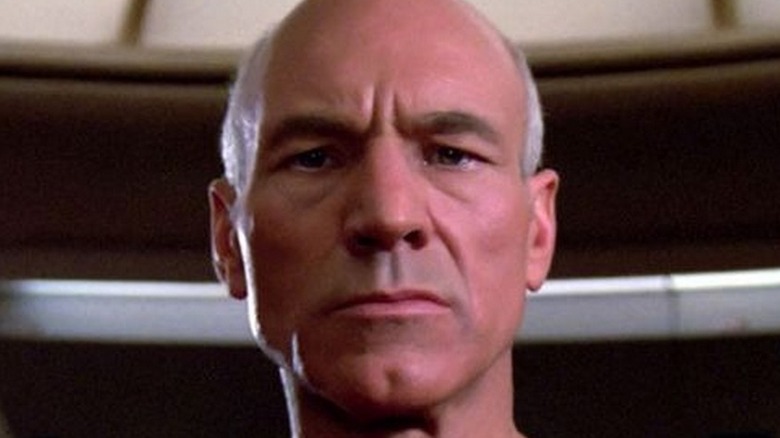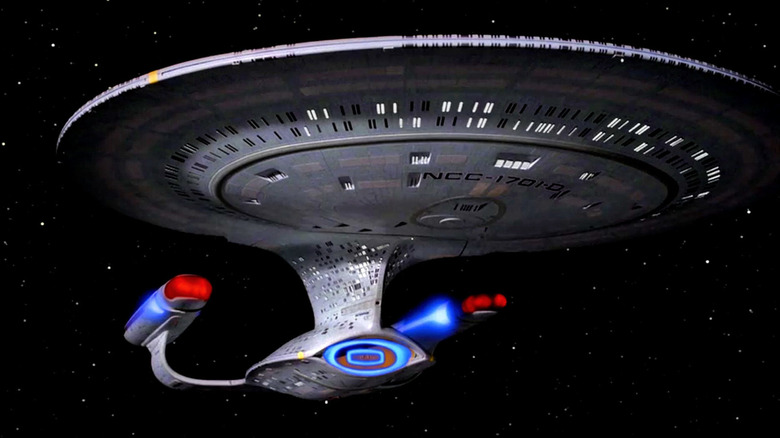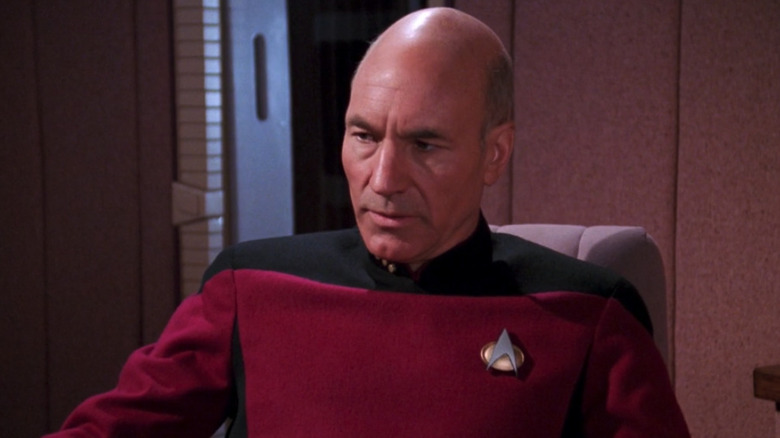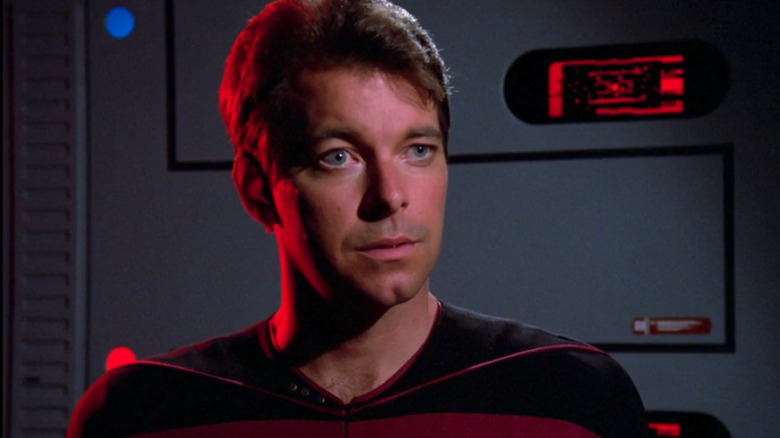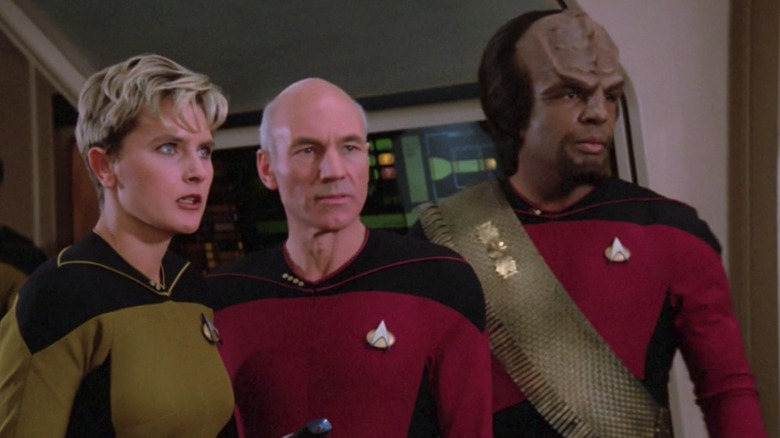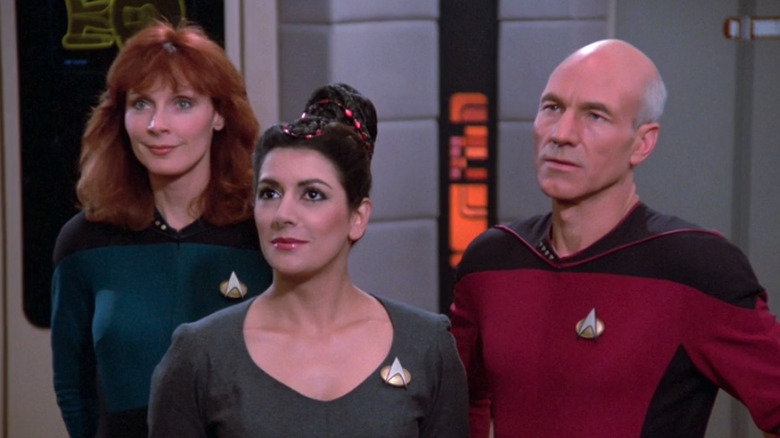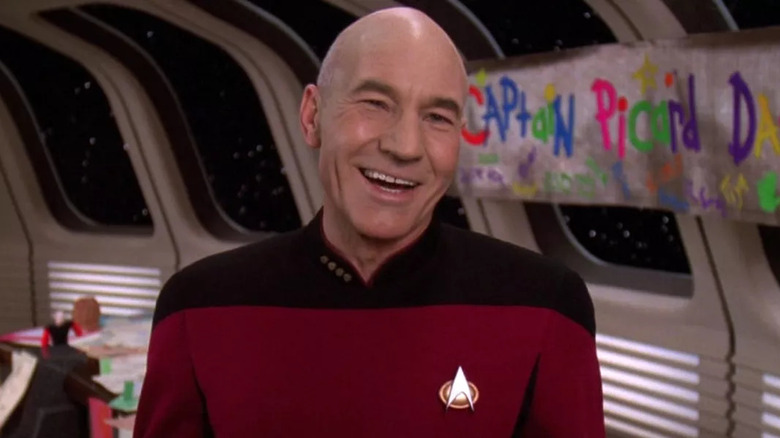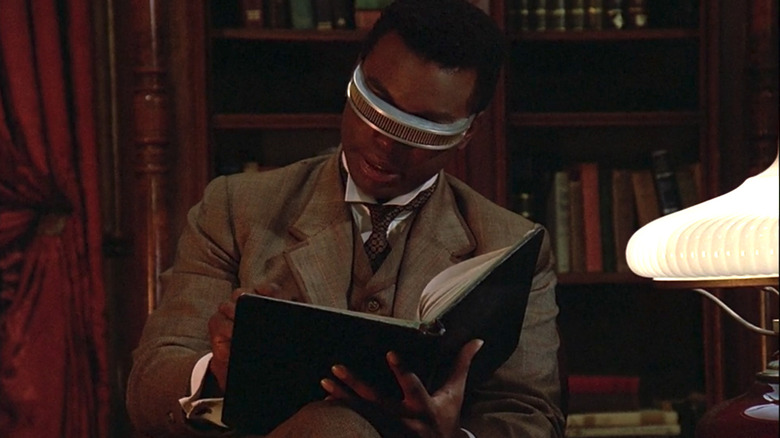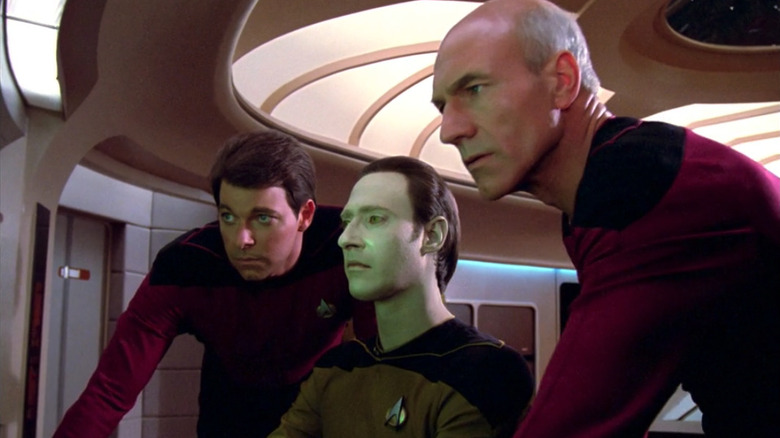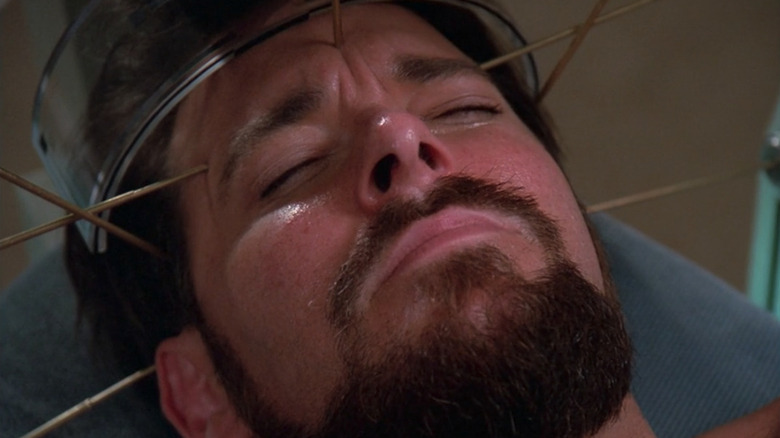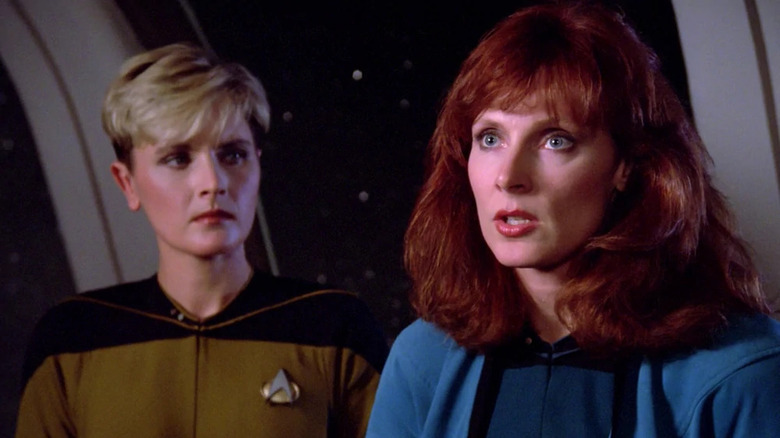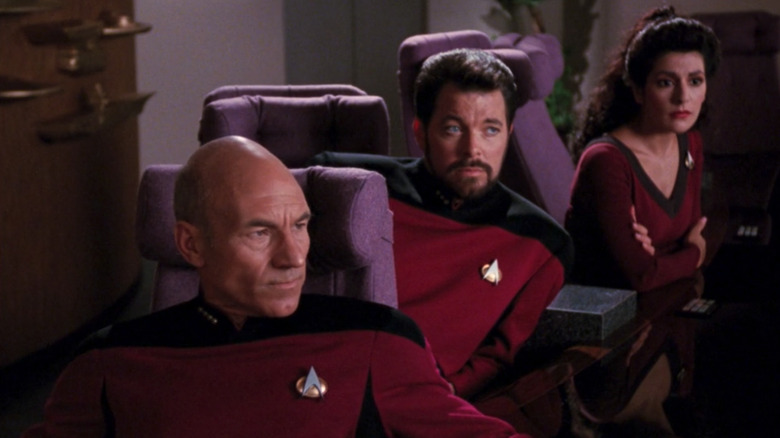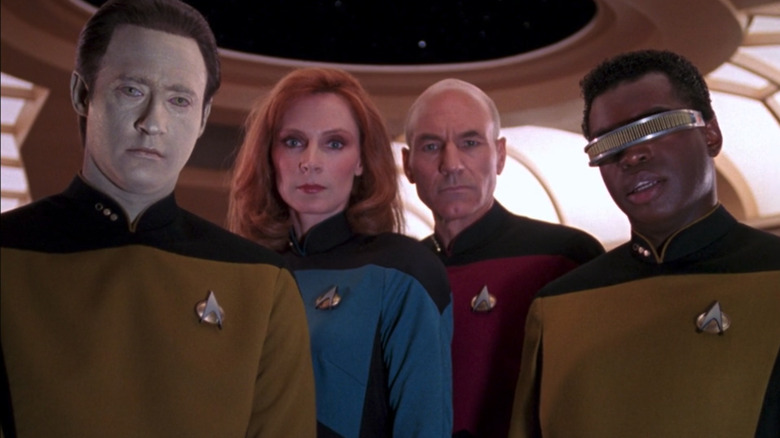The Untold Truth Of Star Trek: The Next Generation
Running for seven hit seasons — four more than its famous predecessor — "Star Trek: The Next Generation" followed in the footsteps of its parent series by boldly going where no one had gone before. Launching in 1987 to much fanfare, it became well regarded for its strong storytelling and fine ensemble cast, led by British actor Patrick Stewart. But while it initially lived in the shadow of the classic "Star Trek" series, it eventually became an iconic show in its own right.
The series wasn't always a sure thing though, and it wasn't without its problems, as it went through a number of changes, cast shake-ups, and controversies during its run. But eventually it overcame its challenges to become one of the best science fiction shows of all time, with memorable characters and classic episodes that continue to influence the genre to this day.
Thanks to its cultural relevance and enduring legacy, "Star Trek: The Next Generation" has been the subject of numerous behind-the-scenes features that have revealed much about the making of the series, from its successes to its failures. The many actors and producers involved have spoken often about the production in the decades since it first aired, with the 2014 documentary "Chaos On The Bridge," hosted by William Shatner, exposing a wealth of juicy stories. We've combed through them all to give you the untold truth of "Star Trek: The Next Generation."
Every network turned it down
When "Star Trek: The Next Generation" was first conceived, the belief was that it would air on one of the three major networks at the time: ABC, CBS, or NBC. After all, the original "Star Trek" series had aired on NBC, and there were few other options, with cable TV still in its relative infancy. But as former Paramount Studios president John Pike described in the documentary "Chaos On The Bridge," the series was ultimately turned down by all three networks — and they probably all regret it now.
Of course, the initial idea was for the series to be the first show on an entirely new network that eventually became Fox. But the man in charge of the new network, Barry Diller, refused to commit to a full 26-episode season, instead asking for just half that amount. According to Pike, he couldn't make the finances work with just 13 and needed a full 26, so he explored the other networks to see if anyone else was interested. Surprisingly, NBC and ABC rejected the series outright, while CBS considered it — but only if they could do it as a miniseries, which was even less than what Fox had offered.
Finding no answers at the major networks, Pike looked inward to Paramount, where the president of distribution, Lucie Salhany, offered up an unprecedented option. Instead of contracting with a major network, Paramount would put the show out in first-run syndication instead, selling it to stations across the country region by region.
The Next Generation broke all the rules
It may be hard to imagine today but in the mid '80s, the idea of reviving "Star Trek" on television wasn't considered a sure thing, which is why the networks had all turned it down. But how could a series with the name "Star Trek" be considered so risky, especially when there were hit "Trek" movies on the big screen at the same time? For starters, the series wouldn't star Kirk or Spock, and the original Enterprise would be nowhere in sight. This new series would feature an entirely new ship and fresh cast of characters, making it a big question mark. Throw in the fact that science fiction wasn't a big draw on television at the time, and you start to realize just how uncertain it might have been.
Additionally, taking a high profile one-hour drama out into first-run syndication was virtually unheard of at the time. It was a big gamble, but it paid off and became a new TV model. A flurry of similar dramas launched in syndication in the years after, including "Hercules: The Legendary Journeys," "Baywatch," and "Highlander: The Series."
On top of all that, "The Next Generation" was a sequel to an iconic series, something that might seem today like a no-brainer, but at the time had never been done with much success. In short, in assembling "The Next Generation," Paramount didn't just make a great new series, they broke all the rules to do it.
Star Trek: The Next Generation was controversial
You might think the announcement of a new "Star Trek" TV series would have every Trekkie celebrating, but that was not the case when "The Next Generation" was unveiled to the public ahead of its release. At that time, the only "Star Trek" that people knew was Kirk, Spock, and the original Enterprise. Through three seasons of the original series, a short-lived animated series, and four big-screen feature films, fans had fallen in love with that ship and that crew. But this new "Star Trek" wouldn't include Kirk and Spock, and would instead be set aboard an all-new ship with an entirely different cast of characters.
Fans were up in arms, offended that their original beloved crew were seemingly being replaced. To top it all off, their favorite star, William Shatner — James T. Kirk himself — was openly critical of the move. "To call a series 'Star Trek' that doesn't have the cast and the ship in it is an error," he told Starlog magazine at the time. "The error seems to me to be overexposure of the 'Star Trek' name and the possibility of not having the 'Star Trek' quality we've become accustomed to." It took a little while, but eventually Trekkies warmed up to the new cast and the discussions over whether "TNG" was "real Star Trek" ended, replaced with the debate over whether Picard or Kirk was the better captain.
A power struggle behind the scenes
Paramount had been trying to convince "Star Trek" creator Gene Roddenberry to produce a new series for years, feeling that his involvement and his creative vision were integral to making a new series work. But Roddenberry had a well-earned reputation for being stubborn and cantankerous, and had resisted until finally given an offer he couldn't refuse. But just because Roddenberry was finally on board didn't mean the problems were solved, and even before the series began, the studio and Roddenberry were engaged in an epic power struggle for control of the still-unnamed program.
After being shut out of the creative process on the "Star Trek" feature films, his biggest demand was total creative control over the new series, which the studio granted. But between his quarrelsome nature and his ruthless attorney that bullied staff and studio alike, the relationship between Roddenberry and Paramount wasn't an easy one. The first demand the studio had was for a two-hour pilot, while Roddenberry only wanted a one-hour premiere. Threatened with being booted off the series, Roddenberry relented and added a second plot to the series pilot, creating the character of Q.
There was almost a different crew
While the likes of Patrick Stewart, Brent Spiner, Jonathan Frakes, and Marina Sirtis have since become intrinsically linked to their roles as Captain Picard, Commander Data, William Riker, and Deanna Troi, they almost weren't the cast we got in 1987 when "Star Trek: The Next Generation" first beamed into living rooms. A memo that circulated around the studio during the casting process, which surfaced publicly many years later, detailed the many unusual alternate choices who were brought in to audition.
Denise Crosby, who went on to play security chief Tasha Yar, actually auditioned for Counselor Troi, while Rosalind Chao, who would later star as Keiko, the wife of Chief O'Brien on both "TNG" and "DS9," tried out for Tasha. Actor Jeffrey Combs, best known then for "Re-Animator," but who since went on to play the villain Weyoun in "Star Trek: Deep Space Nine," had actually auditioned for the role of first officer Riker, though he wasn't included on the memo. Erik Menyuk — who played The Traveler in three episodes of the series — apparently tested for the android Data, while English actress Jenny Agutter was up for Dr. Crusher. And in what could have been a game-changer, "In The Heat Of The Night" star Yaphet Kotto could have taken the captain's chair.
But most fascinating are the names who were considered for Geordi La Forge, including Tim Russ (who would play Tuvok on "Star Trek: Voyager"), baseball legend Reggie Jackson, and perhaps most interestingly, future "Blade" star Wesley Snipes.
Everyone had to get along
With full creative control, Gene Roddenberry laid out his vision for "Star Trek: The Next Generation" as an evolution of the world he'd created 20 years earlier for his original "Star Trek" series. Bigger, bolder technology included highly advanced replicators, faster warp engines, sleeker starships, and communicators disguised as chest-pin badges. But Roddenberry's personal philosophy of humanism had evolved since 1966 too, and he believed strongly that by the world of the 24th century, humankind would have achieved pure enlightenment, with no more petty squabbling or conflict.
To that end, Roddenberry's most strict edict was that everyone on board the Enterprise would get along, with no internal conflict. Series writers have spoken about this rule, how it was handed down from Roddenberry, and caused strife among the writing staff. Producer Rick Berman talked about how it created problems for them, saying, "If you tell a writer your characters can't have conflict between them, you're just cutting their legs off." The solution was for stories to bring in outside characters to introduce conflict, while later "Trek" series got around the dictum by developing non-Starfleet characters on "Deep Space Nine" and "Voyager" that allowed for the casts of those shows to mix it up.
A merry-go-round of writers
With Roddenberry's complicated series bible, and his oddball rules that meant the characters couldn't even argue, authoring episodes for "Star Trek: The Next Generation" proved problematic for many on the show's writing staff. "We would walk around in each other's offices going, 'I don't know how to write about that, I don't know how to write about perfect people,'" said writer Melinda Snodgrass, who worked on the series' first few seasons. The creator himself was also notoriously temperamental, and known for outbursts against writers who couldn't grasp his ideas, while also having a penchant for re-writing scripts himself at the last minute.
According to David Gerrold, who was one of Roddenberry's first hires for the new show, the turnover of writers during the first season of "The Next Generation" reached as many as 30, creating a veritable revolving door of scribes in and out of the writer's room. Gerrold himself departed the show before ever writing an episode for the series. But the waters calmed somewhat by the beginning of the second season: writer Maurice Hurley became the official showrunner, with Roddenberry largely shifting to a more background role, according to Rick Berman, mostly due to his declining health.
Hurley wasn't without his critics though, clashing with actors and writers alike, and even once suggesting they fire the entire cast. Hurley himself would be replaced in the third season by producer Michael Piller.
An episode about AIDS was rejected
Writer David Gerrold, who had penned the classic "Original Series" episode "The Trouble with Tribbles," was one of the first writers brought onboard the new series alongside Dorothy Fontana. Invited to pitch stories for the "The Next Generation," he was told that the show's syndicated nature would free it from many of the creative constraints of a network series. One of his first concepts was a story that proved too controversial for Roddenberry and other producers, an episode titled "Blood and Fire." He's spoken about the story many times over the years, and did so again with Heavy.com in 2021.
Told by Roddenberry that it was time for the franchise to introduce a gay character, Gerrold penned a story that included a pair of gay crewmen, one of whom contracts a deadly disease. An obvious allegory for the AIDS epidemic that was making news in the mid-1980s, the premise had been previously approved and even the issue of a gay crew member had been okayed by producer Rick Berman, according to Gerrold. So it came as a complete surprise when his script was rejected. Gerrold felt that this was just the kind of story that "Trek" should be tackling, and despite attempts to address their concerns through rewrites, the episode was shelved. Upset with his experience, Gerrold left the show shortly thereafter without ever contributing a script.
A writer's strike almost got the show canned
In 1988, a devastating writer's strike hit Hollywood, and impacted a number of productions. That included "Star Trek: The Next Generation," which had just wrapped its first season. Running for 153 days, the strike remains the longest in Hollywood history to this day. Due to union rules, the writers could not produce scripts, and producers could not even communicate with the writing staff to prepare for the end of the strike. This left a number of stories in limbo, and production on the series' second season in doubt.
According to actor Patrick Stewart, the talk around town wasn't good, and some feared his show would be a casualty. "I remember having lunch with a couple of executives from Paramount," the actor said, "And they were saying, 'It's really bad, and I think your show will be one of the first to be canceled.'" The strike was eventually resolved and production resumed, though it cost the series' second season a handful of episodes. There were only 22 produced that year instead of the customary 26, though it did result in one of the series' best episodes: seeking already completed stories, producers uncovered a spec script submitted by Melinda Snodgrass about Data's rights as an individual coming under attack. With no new scripts able to be commissioned, they put it into production and it became "The Measure Of A Man."
Major cast changes
In its first season, "Star Trek: The Next Generation" boasted an ensemble cast of nine actors, but by the beginning of its second season, only seven remained. The upheaval was sparked by struggles behind the scenes, with writers frustrated and the studio at odds with the creator. While many of the actors were having fun on the series, Denise Crosby wasn't. "I was miserable," she told TrekMovie.com in 2012. "I couldn't wait to get off that show. I was dying." Tired of standing behind the captain with little to do for long hours, with few scenes of her own, she finally asked off the series midway through the first season: "This was not an overnight decision ... but I didn't want to spend the next six years going 'Aye, aye, captain,' and standing there, in the same uniform, in the same position on the bridge."
Crosby's departure left a hole in the series, but not one nearly as big as when actress Gates McFadden was released after the conclusion of the show's first year. An outspoken actress, she drew the ire of then-showrunner Maurice Hurley by speaking her mind on issues she had with scripts. McFadden revealed in 2021 to IGN that Hurley had her fired "because I would speak up. If I thought something was racist or sexist, I would just say it ... And that's not the way you do it in Hollywood." Ultimately, both actresses would make comebacks, with Crosby reprising her role on several occasions, while McFadden returned to the series full-time in the third season after Hurley had left.
Fans could submit their own scripts
In the original "Star Trek: The Next Generation" series bible, it's stated that only scripts presented via official literary agents would be accepted, but all that changed as the series continued. Famously, the series allowed anyone, from professional writers down to diehard fans, to submit their own scripts for consideration to producers. It was a concept thought up by writer Ronald D. Moore (who would later create the reboot of "Battlestar Galactica"). In a 2020 interview with Collider, Moore spoke about how he raised the possibility of opening up the submission process after his own first script had been purchased by showrunner Michael Piller.
"After Michael found my script, Michael decided, 'Oh, this is a great resource. We should open the gates up to the fan community and people that want to write for the show,'" said Moore. "We started getting like 3,000 scripts a year. And we had at least five full-time script readers who did nothing but read 'Next Generation' scripts."
According to Moore, it was a boon not just for the series, but for a number of writers who got their start through the program. "A lot of writers ... came in and pitched for the first time because of that. Some of them sold stories. Bryan Fuller, I believe, got his start that way. And Jane Espenson I believe also."
Five cast members directed episodes of Trek
In another unusual move, producers allowed many of their actors to spread their wings and explore their talents behind the camera too. Actor Jonathan Frakes spoke to StarTrek.com in 2019 about the so-called "Trek Director's School" that over the years produced a number of talented directors. "In the beginning of Season 2 I voiced an interest to Rick [Berman] about directing," said Frakes. While Berman was leery, he knew Frakes needed more than just interest and arranged to help him learn the ropes, including skills like editing.
"I spent about 300 hours, maybe, in the editing room," Frakes recalled. "Then Rick also allowed me, because I showed interest, into pre-production meetings and casting sessions." Eventually, Frakes would helm the third season segment "The Offspring," the first of eight episodes he directed. He'd eventually go on to direct two of the four "TNG" feature films, as well as episodes of other "Trek" shows including "Star Trek: Discovery" and "Star Trek: Picard."
But he wasn't the only one: LeVar Burton would undergo the same training, and all told directed 28 episodes of "Star Trek" across four series. Actress Gates McFadden tried her hand directing an episode, while Patrick Stewart directed a total of five. Michael Dorn, who played Lt. Worf, would also sit in the director's chair after joining the cast of "Deep Space Nine," helming four episodes. In the end, several actors from "TNG," "DS9," and "Voyager" wound up turning to directing full time.
